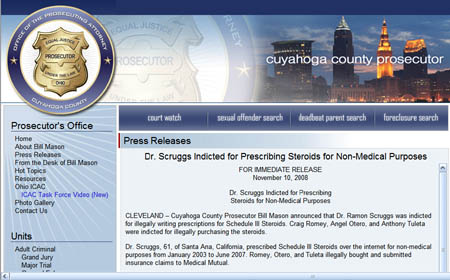Three individuals who purchased anabolic steroids with a prescription for their own personal use were indicted on steroid possession charges. Cleveland Police Lieutenant Anthony Tuleta, former firefighter Craig Romey and former EMS paramedic Angel Otero purchased various anabolic steroids and human growth hormone with prescriptions obtained over the Internet from California-based physician Ramon Scruggs via the New Hope Med website. A Cuyahoga County grand jury indicted Tuleta, Romey and Otero on multiple drug (steroid) possession charges for illegally purchasing steroids for bodybuilding purposes (“Cleveland cop, firefighter and paramedic charged in steroid probe,” November 10).
Police Lt. Anthony Tuleta, 50, former firefighter Craig Romey, 38, and former EMS paramedic Angel Otero, 41, received prescriptions over the Internet between January 2003 and June 2007 from Dr. Ramon Scruggs of Santa Ana, Calif., prosecutors said. Scruggs faces 13 charges for drug trafficking.
Prosecutors have rarely pursued cases against individual steroid users who obtained steroids with a doctor’s prescription. Successful prosecution would require successfully defining and proving legally ambigous issues like what constitutes a “valid medical prescription,” “legitimate medical purpose,” and “doctor-patient relationship.” Only recently has legislation (i.e. Ryan Haight Act) been introduced to clarify such definitions. Perhaps prosecutors are now emboldened to take on such cases now that the Act has passed and will be enacted in April 2009 (“Ryan Haight Act: Internet Pharmacy Criminal Defense Issues,” October 1).
The Ryan Haight Act attempts to clear up the ambiguity associated with with what constitutes valid prescriptions. The current version of the The Controlled Substances Act makes it illegal to distribute any of its schedule III and IV drugs; however, it exempts from prosecution individuals that have licenses to distribute controlled Schedule III and IV substances with a valid prescription (i.e. physicians). 21 USC 829(b). The CSA refrains from noting what a valid prescription is. Instead, one must look to the C.F.R. 1306.04(a):
A prescription for a controlled substance to be effective must be issued for a legitimate medical purpose by an individual practitioner acting in the usual course of his professional practice.
The confusion lies, as I have previously discussed, in what actually constitutes “acting in the usual course of professional practice.” Previous cases and the DEA equate that to the need for a doctor-patient relationship. Unfortunately, the Federation of State Medical Boards has expressly said that online consultations without doctor physical examinations do, in fact, constitute doctor-patient relationships.
The defendants brought attention to their steroid use by submitting insurance claims for large quantities of anabolic steroids and/or other performance enhancing drugs ($95,000, $23,355 and $9,262 worth of steroids and HGH over a 3-1/2 year period). The insurance company determined that the steroids were prescribed for non-medical purposes and turned the case over to the DEA.
Tuleta, Romey and Otero submitted claims to Medical Mutual of Ohio, said Ryan Miday, spokesman for the prosecutor’s office. The insurance company contacted the U.S. Drug Enforcement Administration because the large amounts of drugs were being prescribed for non-medical uses, he said.
Investigators believe the men used the drugs for bodybuilding and did not sell them, Miday said. None of the four men could be reached to comment on the charges.
Tuleta, a 27-year officer, submitted nearly $95,000 in claims. He was suspended without pay Monday. Otero, of Cleveland, submitted $9,262 in claims, and Romey, now a firefighter in Las Vegas, submitted $23,355, Miday said. Each faces multiple charges for possession and theft.
Tuleta, Romey and Otero face six, four, and three counts of drug (steroid) possession based on their purchases of anabolic steroids. Dr. Ramon Scruggs faces 13 counts of drug (steroid) trafficking for illegally prescribing steroid and other performance enhancing drugs to these three individuals for non-medical purposes (“Cleveland Police Lieutenant indicted for steroids,” November 10).
Scruggs was indicted on 13 counts of Drug Trafficking. He faces a maximum sentence of 39 ½ years in prison. Romey was indicted on 4 counts of Possession of Drugs and 1 count of Theft. He faces a maximum sentence of 16 ½ years in prison. Otero was indicted on 3 counts of Possession of Drugs and 1 count of Theft. He faces a maximum sentence of 6 years in prison. Tuleta was indicted on 6 counts of Possession of Drugs and 1 count of Theft. He faces a maximum sentence of 24 ½ years in prison.
Ramon Scruggs has previously been linked to the Signature Pharmacy steroid scandal and MLB baseball players. Scruggs was indicted in a separate case by a federal grand jury in San Jose California for various steroid distribution and conspiracy charges in April 2008.
About the author
Millard writes about anabolic steroids and performance enhancing drugs and their use and impact in sport and society. He discusses the medical and non-medical uses of anabolic-androgenic steroids while advocating a harm reduction approach to steroid education.


Leave a Reply
You must be logged in to post a comment.